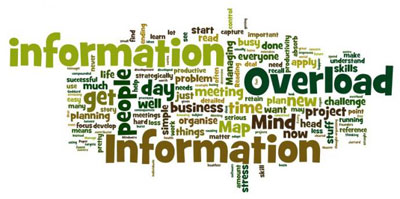Too much information!!
With this article, I would like to share my answer to this very common complain…
Many people complain about the increase of information, the flood of photos, videos, their speed and even channels providing them
 picture cc from mindwerx.com
picture cc from mindwerx.com
The desire to come back to a simple world is growing throughout all ages.
A big argument in the digital transformation is that with all that new media, channels and possibilities, we are creating an information flood (text, photo, video…).
That sounds reasonable – but is only partly true.
[box type=“tick“ style=“rounded“ border=“full“ icon=“none“]We do not „create“ an information flood – we are making it visible / accessible![/box]
In „good old times“ we had reporters, investigating, selecting, curating content and served it via newspaper or TV – We only had to choose our „education level“ (e.g. shows or news)
Also at work our managers made our work simple and selected what we need to know and gave us directions what to do.
That worked fine in an disconnected and mostly stable, local environment. Now we are living in a highly connected, agile and dynamic environment.
The information itself did not really increase – but the options to get to all that information is now available.
If you think of a local newspaper – which filtered „everything“ by topics, which might be interesting by there readers – concerning their culture, location, interest (or political influence)…
Now more and more information is available to everyone – in real time – and WE can decide, what, when, how and where to consume it (and even being able to feedback or influence a topic even from a far distance) – but only, if we have the competence to apply the same filters as back than our reporters.
This is also nothing but going from PUSH (everyone pushes information into your mailbox) to PULL (you get what you need, because it is available, whenever you need it)
[box type=“download“ style=“rounded“ border=“full“ icon=“none“]The big advantage is, that an „educated“ society is now able to inform itself, learn from each other, educate itself, connect to everyone needed and even influence many things by using that power![/box]
Same is in our business environment. In „former times“ you could spend years to develop a new product, years to bring it to the customer (as is) – and if someone came up with the same idea – it was worth spending years at law to fight for the patent. Nowadays – there is barely sense in a patent lawsuit – your product will be completely outdated, once the judges are done with it.
What we do today in bigger organizations is a big waste of time and resources, because the information is not available! In a company with many plants – there are many jobs to be done in every single location. With enterprise social networks – and by making our work and processes more transparent… they get to know each other, learn about and from each other … with the aim of standardization, harmonization and becoming more efficient „together“. This standardization is the basis for a higher individualization – so not about reducing personnel, but providing a better service, or in short: less data handling, more human interaction – or work SMARTer not harder.
Also customers, suppliers and even competitors are connected so intensively, that there is hardly lasting stability – forecasting is becoming very hard and startups can disrupt whole markets within a few month …because of transparency, networking and the co-creation and collaboration – most big organizations still dream about.
Successful startups have learned to sense and filter information, connecting ideas, creating compelling stories out of it to get instant funding (even from millions of people) – to deliver a customer individualized product – without the need of additional marketing.
[box type=“tick“ style=“rounded“ border=“full“ icon=“none“]So what many people see as a threat – becomes the success and value of the ones „mastering it“[/box]
It is not about blaming the availability of information – but building competence in focusing on what is important for us.
Another important competence is authentication of sources – an information is less valuable if we do not know the source (or being able to rate their competence)
(you might not follow my weather forecast – but maybe the one from an professional weather station 😉
„Managing“ our attention/awareness is also vital – since so many channels are offering information in real time, we need to stay „connected to ourselves“ – not to get constantly distracted or „carried away“ from a constantly disturbing news stream.
Is it too much information?
NO – it has always been „so much“ – we just need to learn handling it in a different way, since we now have more options – and they come with responsibility … and the need to learn.
In the end it is everyone’s decision,
if you want to be on the „arguing“ or the „winning“ path 😉
Once you have trust in that relevant information will find you
– you will have peace in mind again
(but that requires an initial learning investment, building valuable networks
and understanding basic communication principles)

Schreibe einen Kommentar